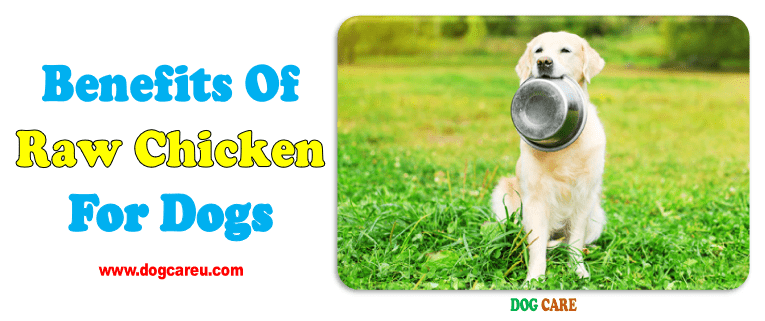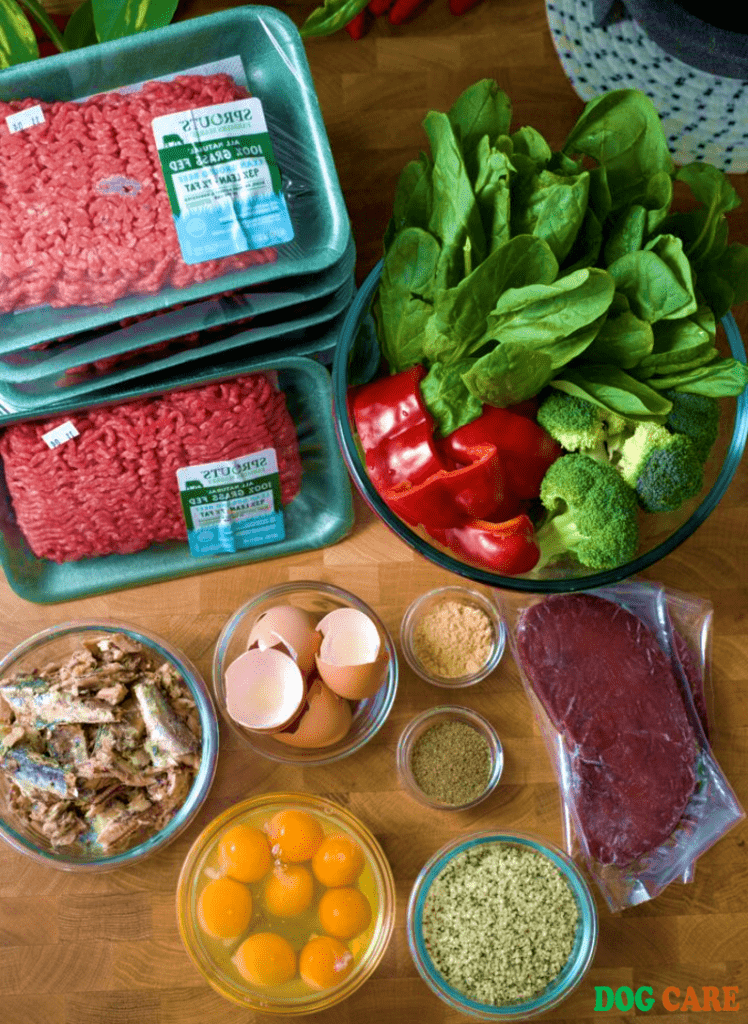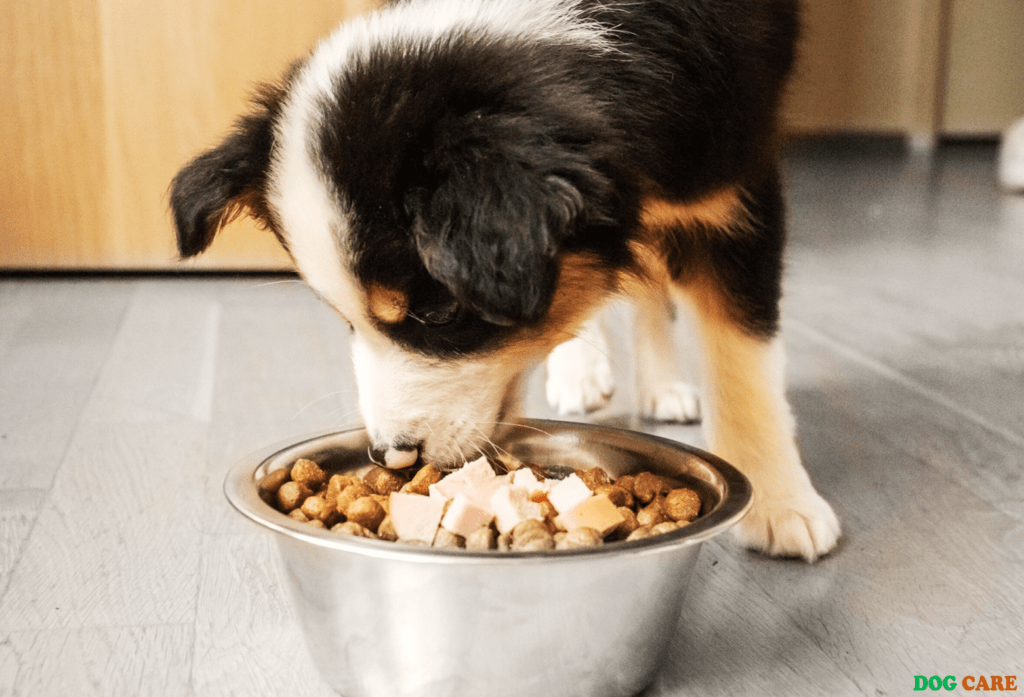Benefits of Raw Chicken for Dogs – Raw chicken can provide numerous benefits for dogs such as improved digestion, strengthened immune system, healthy skin and coat, and increased energy levels. In addition to being a great source of protein, raw chicken contains essential nutrients like vitamins B3, B6, and B12, as well as zinc, iron, and potassium, that contribute to the overall health and well-being of dogs.
Feeding raw chicken to dogs can also help maintain their dental health by keeping their teeth clean and reducing tartar buildup. Moreover, the natural enzymes found in raw chicken can aid in the digestion of other foods. It is important, however, to handle and prepare raw chicken properly to avoid the risk of contamination and ensure the safety of both your dog and your household.

The Nutritional Benefits Of Raw Chicken For Dogs
Raw chicken can be a highly nutritious addition to your dog’s diet, providing a range of benefits that promote overall health and well-being. This article will explore the nutritional advantages of including raw chicken in your canine companion’s meals. From high-quality protein to healthy fats and essential omega-6 fatty acids, raw chicken offers a variety of essential nutrients that can support your dog’s optimal health.
High-quality Protein
Raw chicken is an excellent source of high-quality protein, which is vital for your dog’s growth, repair, and maintenance of muscles, tissues, and organs. Protein plays a crucial role in your canine’s overall health, helping to build and strengthen bones, support healthy skin and coat, and boost the immune system.
Moreover, the protein found in raw chicken contains a complete amino acid profile, including all the essential amino acids your dog needs to thrive. Amino acids are the building blocks of protein and are essential for the development and proper functioning of your dog’s body.
Healthy Fats And Omega-6
Raw chicken also provides healthy fats and omega-6 fatty acids, which are essential for your dog’s overall health. These fats play a vital role in maintaining healthy skin and a glossy coat, as well as supporting proper brain function and reproductive health.
The omega-6 fatty acids found in raw chicken contribute to a healthy inflammatory response in your dog’s body, helping to reduce the risk of chronic inflammation and associated health conditions. Furthermore, these fats support the absorption of fat-soluble vitamins, such as vitamins A, D, E, and K, ensuring your dog receives the full benefits from their diet.
When feeding your dog raw chicken, it’s important to remember that moderation is key. While raw chicken offers many nutritional benefits, it should be included as part of a balanced diet that includes a variety of other protein sources, fruits, vegetables, and supplements to ensure your dog receives all the necessary nutrients.
Reducing The Risk Of Allergies And Sensitivities
Raw chicken can be a beneficial addition to your furry friend’s diet, particularly when it comes to reducing the risk of allergies and sensitivities. Commercial dog food often contains additives and preservatives that can trigger adverse reactions in some pets, leading to uncomfortable symptoms and potential health issues.
When you opt for raw chicken as part of your dog’s diet, you eliminate the risk of exposing them to unnecessary additives and preservatives commonly found in processed dog food. These artificial ingredients can be problematic for sensitive dogs, potentially causing skin irritations, digestive problems, or even contributing to the development of allergies over time.
By feeding your dog raw chicken, you can ensure that their diet remains free from these potentially harmful substances. By eliminating additives and preservatives, you are giving your four-legged companion a purer, more natural source of nutrition that is less likely to trigger allergies or sensitivities.
Improving Digestive Health
Another benefit of incorporating raw chicken into your dog’s diet is its positive impact on their digestive health. Raw chicken is rich in digestive enzymes that can aid in the proper breakdown of food, making it easier for your dog to absorb and utilize essential nutrients.
Additionally, the raw nature of the chicken provides a source of moisture that can help prevent dehydration and support healthy digestion. The moisture content of this uncooked meat can be beneficial for dogs with sensitive stomachs or those prone to digestive issues.
Feeding your dog raw chicken can therefore contribute to maintaining a well-functioning digestive system, reducing the risk of gastrointestinal discomfort, and promoting overall digestive health.
In conclusion, introducing raw chicken into your dog’s diet can bring various benefits, particularly in reducing the risk of allergies and sensitivities. By eliminating additives and preservatives, you support your dog’s overall health and well-being. Additionally, the natural enzymes and moisture in raw chicken can aid in digestion and prevent digestive issues. Make sure to consult with your veterinarian to determine the appropriate portions and ensure a balanced diet for your pup.
Supporting Dental Health And Overall Wellbeing
Supporting the dental health and overall wellbeing of your furry friend is of paramount importance. Feeding raw chicken to dogs offers a myriad of benefits, one of which includes natural teeth cleaning, leading to enhanced energy and muscle maintenance.
Natural Teeth Cleaning
Raw chicken for dogs acts as a natural chew toy, helping to scrape off plaque and tartar from their teeth. This natural chewing motion provides an effective way to prevent dental issues and promotes healthy gums, leading to better overall dental health.
Enhanced Energy And Muscle Maintenance
Feeding raw chicken to dogs ensures the intake of high-quality protein, which is essential for maintaining energy levels and supporting muscle health. It provides the necessary nutrients for overall wellbeing, promoting a healthy and active lifestyle for your furry companion.
Safety Precautions When Feeding Raw Chicken To Dogs
Raw chicken can be beneficial for dogs, providing essential nutrients and promoting a healthy coat and skin. When feeding raw chicken, ensure it’s fresh and properly handled to avoid contamination. Supervise your dog while they eat and always consult a veterinarian before making any dietary changes.
Handling And Storage Guidelines
When it comes to feeding your dog raw chicken, it’s crucial to follow proper handling and storage guidelines to ensure both the dog’s safety and your own.
1. Always wash your hands thoroughly before and after handling raw chicken. This helps prevent the spread of bacteria and potential illnesses.
2. Use separate utensils and cutting boards for raw chicken and other foods to avoid cross-contamination. This minimizes the risk of bacteria spreading to other foods.
3. Keep raw chicken refrigerated at all times. Ensure the chicken is stored in a leak-proof container or sealed plastic bag on the bottom shelf of the fridge to prevent any potential contamination.
4. Freeze raw chicken if you are not planning to use it within two days. This helps preserve its freshness and prevents the growth of harmful bacteria.
5. Thaw frozen raw chicken in the refrigerator, never at room temperature, to avoid bacterial growth. Allow enough time for proper thawing to ensure the chicken is fully defrosted before feeding it to your dog.
Consulting A Veterinarian
Before introducing raw chicken or any new diet to your dog’s routine, it’s always best to consult with a veterinarian.
1. Every dog is unique, and their dietary needs may vary based on factors such as age, size, breed, and overall health. Consulting a veterinarian helps determine if raw chicken is suitable for your dog and the right portion size to feed.
2. Some dogs may have underlying health conditions or specific dietary restrictions that require special consideration. A veterinarian can provide professional advice tailored to your dog’s specific needs.
3. It’s essential to understand the potential risks associated with feeding raw chicken, such as bacterial infections, especially for dogs with compromised immune systems. A veterinarian can provide guidance on how to minimize these risks and address any concerns you may have.
Overall, following proper handling and storage guidelines and consulting a veterinarian before feeding raw chicken to your dog helps ensure their safety and overall well-being. By being cautious and proactive, you can provide a nutritious and wholesome diet that supports your dog’s health.
Transitioning Dogs To A Raw Chicken Diet
Switching your furry companion to a raw chicken diet can have numerous benefits for their overall health and well-being. However, it is important to approach this transition gradually and with careful monitoring. By following a few key steps, you can ensure a smooth adjustment process for your beloved pet.
Gradual Diet Adjustment
To begin the transition, gradually introduce small portions of raw chicken into your dog’s current diet. Start by replacing a small portion of their regular food with raw chicken and observe how they respond. Over time, increase the amount of raw chicken while reducing the other food until your dog is solely on a raw chicken diet. This gradual adjustment allows their digestive system to adapt and prevents any sudden gastrointestinal upsets.
Monitoring Health And Behaviour Changes
Throughout the transition, closely monitor your dog’s health and behavior for any changes. Keep an eye out for any signs of digestive issues, such as diarrhea or vomiting, as these may indicate a need to adjust the diet or consult a veterinarian. Additionally, observe their energy levels, coat condition, and overall well-being. A well-balanced raw chicken diet can lead to improved energy, healthier skin, and a shinier coat for your four-legged friend.
In conclusion, transitioning your dog to a raw chicken diet offers numerous benefits for their health and well-being. By following a gradual adjustment process, and monitoring their health and behavior closely, you can ensure a smooth transition. Remember, while raw chicken can be a beneficial addition to their diet, it is essential to consult with a veterinarian to ensure it is suitable for your specific dog’s needs.
Frequently Asked Questions On Benefits Of Raw Chicken For Dogs
Is It Ok To Feed My Dog Raw Chicken?
Yes, it is generally safe to feed your dog raw chicken. However, precautions must be taken to prevent foodborne illnesses. Ensure the chicken is fresh, properly handled, and supply a balanced diet with the guidance of a veterinarian. Avoid feeding bones or cooked chicken, as they can be harmful to dogs.
Is Cooked Chicken Better Than Raw For Dogs?
Cooked chicken is better for dogs than raw because it eliminates the risk of harmful bacteria like salmonella. Plus, cooking chicken makes it easier for dogs to digest and absorb nutrients. Remember to remove bones and seasoning before feeding cooked chicken to your furry friend.
How Do Dogs Not Get Sick From Raw Chicken?
Dogs have strong stomach acid that kills harmful bacteria in raw chicken, minimizing the risk of illness. Additionally, their short digestive tract allows for a quick passage of food, reducing the chance of bacterial growth. Proper handling and clean sourcing also help prevent sickness.
Do Vets Recommend Raw Diet For Dogs?
Yes, veterinarians recommend raw diets for dogs as it can provide various health benefits. It supports their natural digestive system, improves coat and skin condition, and can help manage weight. However, it is essential to consult with a vet to ensure the diet meets the dog’s nutritional needs.
Conclusion
Incorporating raw chicken into your dog’s diet provides a host of benefits, from improved digestion to better coat health and overall vitality. By providing essential nutrients and enzymes, raw chicken can contribute to a healthier and happier canine companion. Consider adding raw chicken to your dog’s diet for long-term wellness and vitality.


